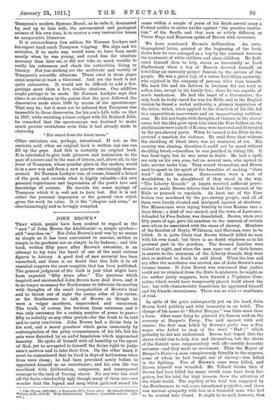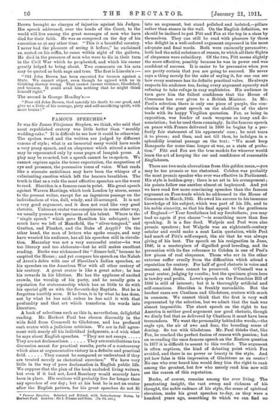JOHN BROWN.*
THAT which people have been content to regard as the 4' soul " of John Brown the Abolitionist—a simple symbol— still "marches on." But John Brown's soul was by no means so simple as it has been convenient to assume, neither so simple in its goodness nor so simple in its badness ; and this book, written fifty years after Brown's execution, is an attempt to lay bare the heart of one of the most curious figures in history. A good deal of new material has been (unearthed, and there is no doubt that this Life is in all .essential respects the most complete that has been published. The general judgment of the book is just what might have been expected "fifty years after." The passions which inspired and surrounded John Brown have died down, and it is no longer necessary for Northerners to infuriate themselves with thoughts of the small irregularities of Brown's trial and to thrust out of sight the seamy sides of his career, or for Southerners to talk of Brown as though he were a vulgar murderer, unprovoked and unexcused. The truth, of course, lies between these extremes, and it was only necessary for a certain number of years to pass— ;fifty as suitably as any other period—for the truth to be told and to carry conviction. John Brown had a divine fury in his soul, and a moral grandeur which gains immensely by contemplation of the petty circumstances of his life, but his acts were distorted by an awful fanaticism which approached insanity. He spoke of himself with all humility as the agent of God, yet he arrogated to himself the divine right to judge men's motives and to take their lives. On the other hand, it must be remembered that he lived in days of lawlessness when lives were cheap ; he had been provoked sorely before he appointed himself as an executioner ; and his own life was sacrificed with deliberation, composure, and unsurpassed -courage to the task of freeing slaves. No one who has read all the facts—irreducibly ugly though many of them are—can wonder that the legend and song which gathered round his • John Brown, 1809.1859: o Biography Fifty Years After. By Oswald Garrison A.M., Litt.D. With Illustrations. London : Constable and Co. [21s. pet.
name within a couple of years of his death nerved many a Federal soldier to strike harder against " the peculiar institu- tion" of the South, and that men so widely different as Victor Hugo and Emerson spoke of Brown with reverence.
We have mentioned Brown's deliberation. An auto- biographical letter, printed at the beginning of the book, shows how he was outraged as a boy by the contrast between the treatment of white children and slave children. He dedi- cated himself then to help slaves as irrevocably as Lord Shaftesbury when a boy at Harrow devoted himself, on beholding an unseemly pauper funeral, to the service of the people. He was a grave boy, of a rather forbidding austerity, who rejoiced in the company of persons older than himself. His bard life and his failures in business did not tend to soften him, except in his family ties ; there he was capable of much tenderness. He had the heart of a Covenanter; the only book he truly cared for was his Bible, and in the English version he found a verbal authority, a plenary inspiration of the letter, which, when applied to the direction of his life, led to a superstitious narrowness and an unquestioning ruthless- ness. He did not begin with thoughts of violence in the slaves' cause, but the idea grew upon him when the Free Soilers (as the abolitionists were called) of Kansas were hectored and ill-treated by the pro-slavery party. When he turned to his Bible he dis- covered a sanction for violence. He read there that without the shedding of blood there was no remission of sin. His country was sinning, therefore it could not be saved without shedding blood,—therefore he was justified in taking life. It was fatal logic, but he was never in doubt. He laid a spell, not only on his own sons, but on several men, who agreed to take service under him. They armed themselves, and Brown used to speak in the spirit of the Israelites of making "clean work" of their enemies. Slave-owners were a sort of Amalekites, to be slaughtered if they stood in the way. "The Liberty Guards" at length received sufficient provo- cation to make Brown believe that he had the warrant of the Bible to proceed to reprisals. At least one of the Free Soilers was murdered by the pro-slavery people, and all of them were basely cheated and intrigued against at elections. The Missourians were trying forcibly to turn Kansas into a slave State ; a kind of war ensued, and the town of Lawrence, defended by Free Soilers, was demolished. Brown, when over fifty years of age, gave his sanction to the removal of certain men whom he associated with the cause of slavery. Members of the families of Doyle, Wilkinson, and Sherman were to be killed. It is quite likely that Brown himself killed no man with his own band ; but there is no doubt whatever as to his personal part in the murders. The doomed families were visited at night, and when the men came out of their houses in answer to the summons of the Liberty Guards, they were shot or stabbed to death in cold blood. When the hue and cry after the murderers was started, one of John Brown's sons became insane. If John Brown was convinced that justice could not be obtained from the State Legislature, he might, as the author justly suggests, have formed a Vigilance Com- mittee which would have temporarily placed itself above the law ; but with characteristic fanaticism he appointed himself and his friends executioners. There was no trial cr semblance of trial.
In spite of the price subsequently put on his head, John Brown lived publicly and with immunity in an hotel. The change of his name to " Shubel Morgan " was little more than a form. After some delay he planned his famous raid on the armoury at Harper's Ferry. The raid opened with evil omens ; the first man killed by Brown's party was a free negro who failed to stop at the word " Halt !" which probably he did not understand. Brown had hoped that the slaves would rise to help him and themselves, but the slaves of the district were comparatively well off—mostly domestic servants—and they made no movement. Then the Mayor of Harper's Ferry—a man conspicuously friendly to the negroes, some of whom he had bought out of slavery—was killed in the fighting. Two of Brown's sons were killed, and Brown himself was wounded. Mr. Villard thinks that if Brown had been killed his name would soon have been for- gotten, but his trial for high treason drew the attention of the whole world. The rapidity of his trial was supposed by the Northerners to veil some intentional prejudice, and there was natural sympathy with him as a wounded man who had to be carried into Court. It ought to be said, however, that
Brown brought no charges of injustice against his Judges. His speech addressed, over the heads of the Court, to the world will live among the great messages of men who have died for their faith. He was as composed on the day of his execution as at any other time. " This is a beautiful country. I never had the pleasure of seeing it before," he exclaimed as, seated on his coffin, he came within sight of the gallows. He died in the presence of men who were to die in their turn in the Civil War which he prophesied, and which his career greatly helped to bring about. Two comments on his acts may be quoted as both sage and true. The first is Lincoln's :- " Old John Brown has been executed for treason against a State. We cannot object, even though he agreed with us in thinking slavery wrong. That cannot excuse violence, bloodshed, and treason. It could avail him nothing that he might think himF.elf right."
The second is George Hoadley's
:- "Poor old John Brown, God sanctify his death to our good, and give us a little of his courage, piety and self-sacrificing spirit, with more brains !"











































 Previous page
Previous page